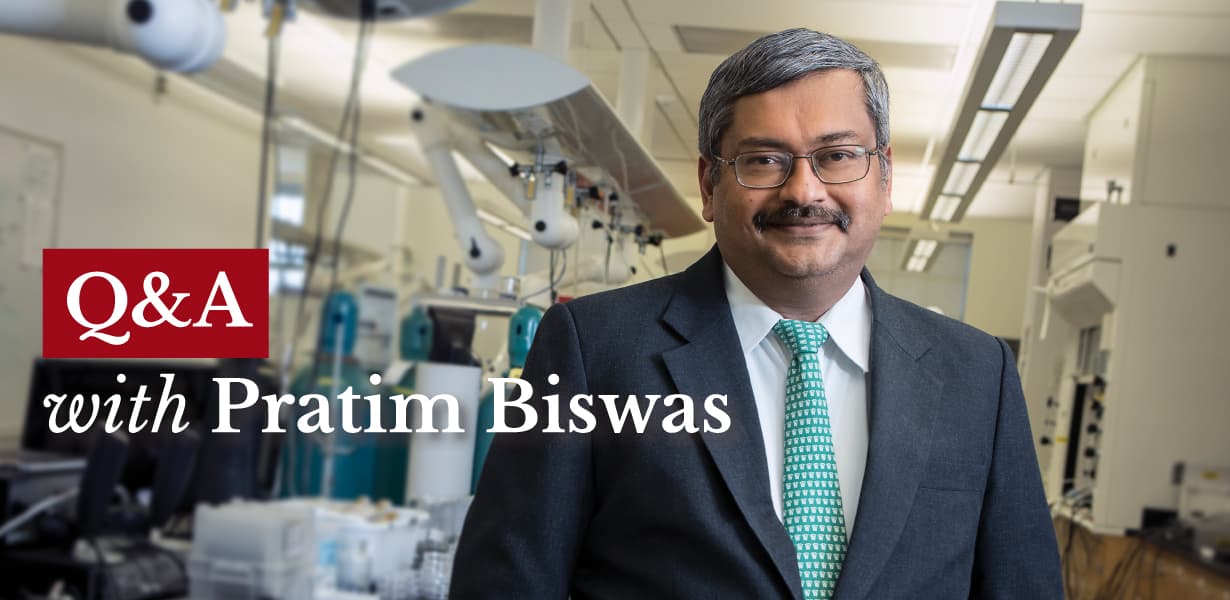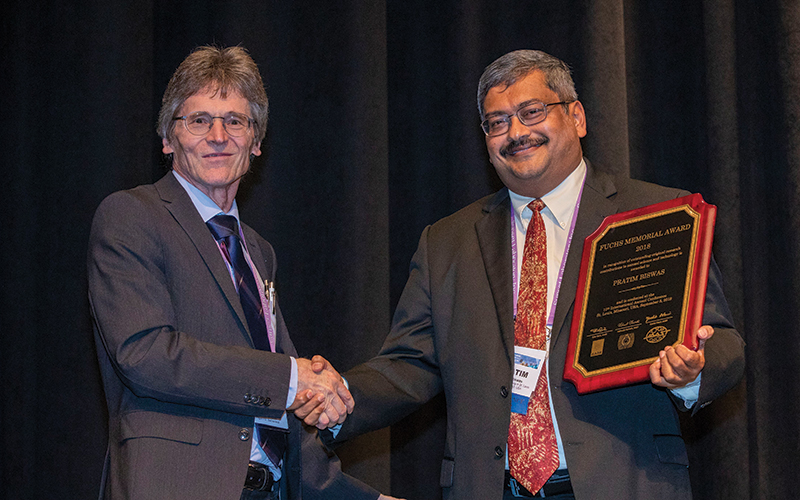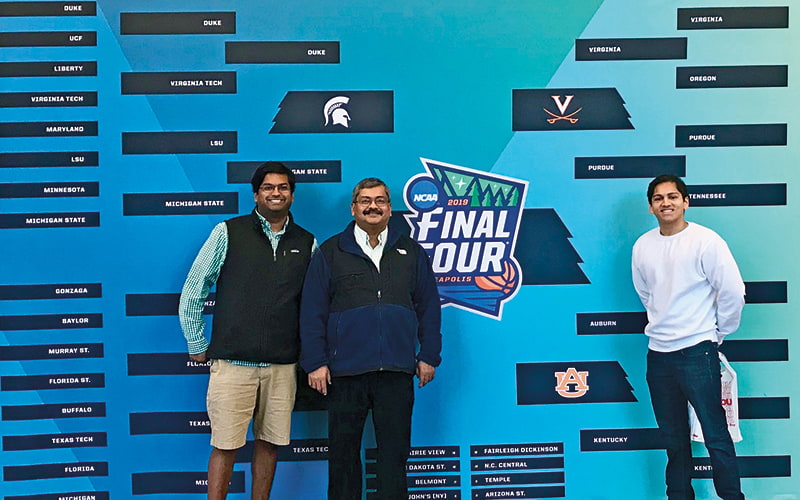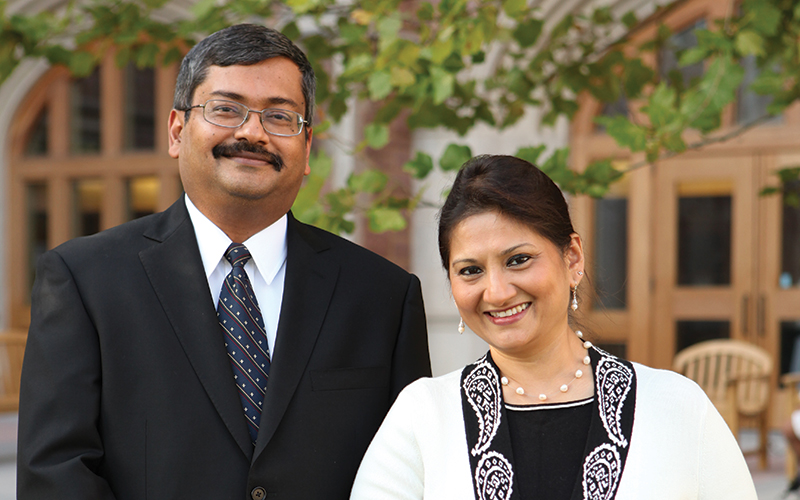Q&A with Pratim Biswas
After recently being elected to the National Academy of Engineering, Pratim Biswas shares the rewards and challenges of his work

Internationally renowned aerosol scientist Pratim Biswas, the Lucy & Stanley Lopata Professor in the McKelvey School of Engineering, was recently elected to the National Academy of Engineering (NAE), considered one of the highest honors in the field of engineering.
Biswas, also assistant vice chancellor of international programs and chair of the Department of Energy, Environmental & Chemical Engineering, holds 10 patents and has spun off two startup companies based on his inventions, including Applied Particle Technology. He has more than 400 refereed journal publications. His work applying aerosol science to energy and environmental nanotechnology, solar energy use, air pollution control, medicine and other areas was recognized in 2018 with the Fuchs Award, the highest honor given worldwide to an aerosol scientist.
Biswas was chosen by his peers in the NAE "for advancing the science of aerosol dynamics and particle removal technologies." He is one of two McKelvey Engineering faculty in the NAE; the other is Yoram Rudy, the Fred Saigh Distinguished Professor of Engineering in the Department of Biomedical Engineering. Biswas was inducted into the NAE Class of 2019 Oct. 6 in Washington, D.C.
Q. When you came to the U.S. from India with your two suitcases, did you ever imagine that you'd be elected to the National Academy of Engineering?
A. One always has high ambition, but at that stage, I was more focused on earning my PhD. I always wanted to make a difference and a contribution, so this is a good recognition of my efforts. Most of the space in the two suitcases that I brought to this country was taken up by books!
Q. What do you find most challenging about your work?
A. One challenge I face is that while I try to do innovative, impactful work, it takes time for the impact to be realized. I work with young, smart minds — our students — who are so motivated that they want to make a difference right away. Hence, a challenging aspect is to inculcate the values of patience and hard work. I also have responsibilities as the chair of the department, ensuring that I set an example and help the entire department to excel. While there are challenging aspects of my work, I think it is fun and enjoyable.
Q. Tell me about a project or accomplishment that you consider to be the most significant in your career.
A. There are several spanning my career. The overall approach of focusing on a fundamental understanding of aerosol science and engineering, and then applying them to a large number of areas, including some that are quite unique and have never been thought about before. One example is capturing emissions of problematic small particles from combustion systems that are very challenging to trap; by understanding and enhancing charging of small particles and advancing the design of particle capture technology. In addition to these systems being applied on our planet, we will now also need these to be applied in outer space as we enhance exploration of that frontier. The ability to synthesize nanoparticles with controlled size, shape and composition that results in desired functionality has allowed us to develop applications in areas such as solar energy harvesting, nanomedicine for targeted drug delivery, the holy grail of carbon dioxide capture and conversion to value- added chemicals, and efficient nutrient uptake by plants for smart precision agriculture.
These developments and accomplishments have been possible due to work with excellent students and collaborations with colleagues in several other disciplines.

Q. You've received several "pinnacle" awards recently. How does that feel?
A. The Fuchs Award is the highest award worldwide in aerosol science and engineering. The awards received from the American Association for Aerosol Research, American Institute of Chemical Engineers, Association of Environmental Engineering Science Professors and the International Society of Electrostatic Precipitation are a few other societies that have recognized my contributions. I feel humbled to be selected for each of these awards. It's a recognition of the work over the years done by past and current students. The recognition by the NAE is special because it's the entire engineering community in the U.S. that you are selected from.
Q. What’s the best advice you’ve ever received in your career?
A. Enjoy your work. Pursue your passion. Be innovative in what you do. Don’t worry about the immediate results, and with consistent effort, recognition will follow.
Q. Who has been your biggest influence in your career?
A. There have been several. Professors Rick Flagan (Irma and Ross McCollum-William H. Corcoran Professor of Chemical Engineering and professor of Environmental Science and Engineering) and John Seinfeld (Louis E. Nohl Professor & Professor of Chemical Engineering), from Caltech introduced me to this fabulous field of aerosol science and engineering. Another individual who influenced me was Sheldon Friedlander at UCLA, a pioneer and legend in aerosol science. I should also recognize my undergraduate studies mentor and a fabulous instructor, Suhas Sukhatme at IIT Bombay, who laid the foundation stones for my career.
I must mention my early life mentors, my brother, Gautam Biswas, currently a professor at Vanderbilt, and my father, Professor A.B. Biswas. My father set an example by what he did, and much of his style and approach has been a great influence on me. He was an eminent physical chemist who did postdoctoral work at Caltech with Linus Pauling, and then had an illustrious academic career at IIT Bombay.

Q. What might someone be surprised to learn about you?
A. My interest in other things and passion for sports, especially college basketball. This year, I got tickets ahead of time and saw the Final Four in Minneapolis with my two sons. I used to play basketball for my college in India, and we did reasonably well. We didn't have televisions in India when I was growing up, so I could not watch the games live. However, we had a weekly showing of movies in the theater, and there would be a newsreel on sports results from the U.S. They would show basketball games, and UCLA was a wonder team with John Wooden as the coach.
When I first came to the U.S., I spent a year at UCLA and earned a master's degree there, being attracted by the names of Wooden and Lew Alcindor, who then became Kareem Abdul-Jabbar, though they were retired by then. I saw many a home game at UCLA that year (1980-81). Though Wooden had retired, I was surprised to see that he, too, came to watch the UCLA home games. Once I took up the courage and went to meet him and told him how I enjoyed watching in documentary films his successful teams win championships. I was happy that he talked to me and asked about what I do and told me to work hard in what I did. This short interaction has remained as a motivation for me to this day.
Also, my wife, Sujata Biswas, has been a constant encourager and supporter of all that I have done.

